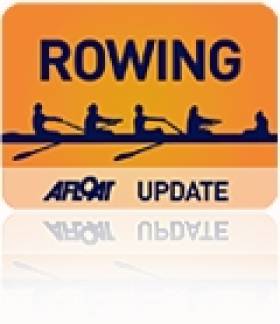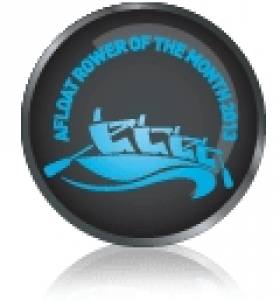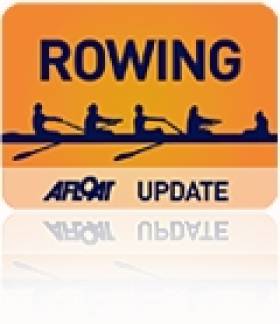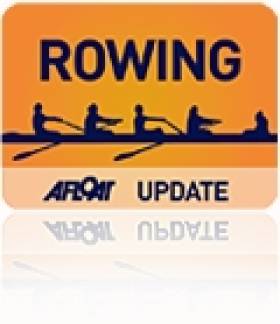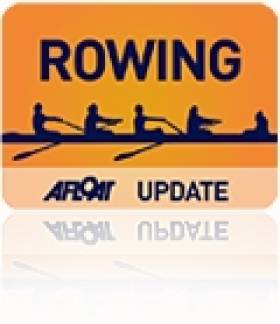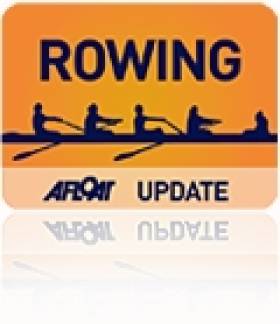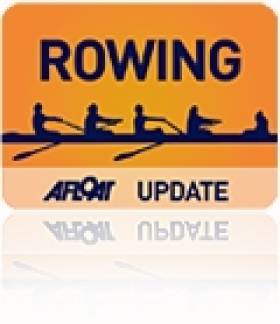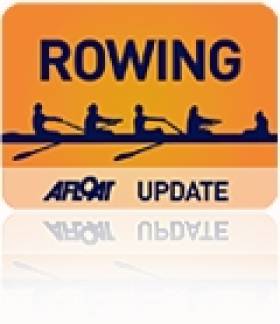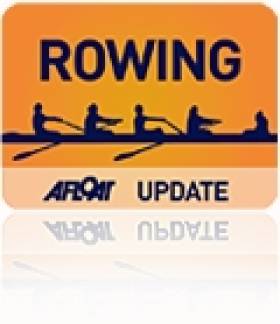Displaying items by tag: O'Donovan
#WorldUnder-23Rowing: Paul O’Donovan won his heat at the World Under-23 Rowing Championships in Linz in Austria today. The lightweight sculler controlled the race and though any of the top four places would have taken him through to the quarter-finals, his win gives him a better lane draw on Friday. Adam Ling of New Zealand was second, 2.66 seconds behind the UCD man.In the final race of the day, Adam Boreham also qualified for his quarter-final, finishing fourth of five in his heat of the single sculls.
World Under-23 Championships, Linz, Austria – Day One (Irish interest)
Men
Four – One Crew Directly to A Final, Rest to Repechage – Heat Two: 1 Romania 6:08.20; Australia 6:13.69, 3 Croatia 6:14.98, 4 Britain 6:15.40, 5 Ireland (R Bennett, M Wray, J Mitchell, R O’Callaghan) 6:18.48.
Single Sculls - First Four to Quarter-Finals, Rest to Repechage – Heat Five: 1 Germany 7:11.64, 2 Slovakia 7:13.99, 3 Montenegro 7:16.60, 4 Ireland (A Boreham) 7:28.36; 5 El Salvador 7:36.19.
Lightweight Single Sculls – First Four to Quarter-Finals, Rest to Repechage – Heat Four: 1 Ireland (P O’Donovan) 7:12.40, 2 New Zealand (A Ling) 7:15.06, 3 Germany (C Mertens) 7:18.66, 4 Slovakia (R Vanco) 7:21.20; 4 Canada (M Christie) 7:24.75.
Women
Four – One Crew Directly to A Final, Rest to Repechage – Heat One: 1 Australia 6:44.65; 2 Ireland (E Tormey, A Sheehan, A Keogh, L Dilleen) 6:54.39, 3 New Zealand 6:54.45, 4 United States 6:55.34, 5 Germany 6:57.42, 6 France 7:05.06. Heat Two (qualifier): 1 Russia 6:50.08.
Afloat Honours O'Donovan for World Cup Performance
# ROWING: Paul O’Donovan is the Afloat Rower of the Month for June. The UCD man had a remarkable start to his career as a senior international, beating former world champion Duncan Grant to win their heat of the lightweight single sculls at the World Cup regatta at Dorney Lake. He qualified for the final by taking second place in the semi-final, and while he found it difficult to find his rhythm in the final, the 19-year-old Skibbereen man had already made his mark. He will represent Ireland at the World Under-23 Championships in Linz in Austria later this month.
Rower of the Month awards: The judging panel is made up of Liam Gorman, rowing correspondent of The Irish Times and David O'Brien, Editor of Afloat magazine. Monthly awards for achievements during the year will appear on afloat.ie and the overall national award will be presented to the person or crew who, in the judges' opinion, achieved the most notable results in, or made the most significant contribution to rowing during 2013. Keep a monthly eye on progress and watch our 2013 champions list grow.
Medals Slip Out of Reach of Lambe and O'Donovan at World Cup
# ROWING WORLD CUP: Ireland’s Claire Lambe finished fifth and Paul O’Donovan sixth in their lightweight single sculls finals this morning at the World Cup regatta at Dorney Lake. In a fast race, O’Donovan stayed in contention for bronze until the closing stages: Pedro Fraga of Portugal won, with Steffen Jensen second. His fellow Dane Andrej Bendtsen made a late charge to deny Duncan Grant of New Zealand bronze.
Lambe’s race belonged to Michaela Taupe-Traer (38). The experienced Austrian took gold ahead of Leonie Pless of Germany, with Brazil’s Fabiana Beltrame making heavy weather of taking bronze despite having the favoured lane six. The lanes had been reallocated because of winds. Lambe and Ruth Walczak of Britain had disputed third with Beltrame through the middle stages of the race.
World Cup Regatta, Dorney Lake, Day Three (Irish interest)
Men
Lightweight Single Sculls – A Final: 1 Portugal (P Fraga) 6:57.02, 2 Denmark One (S Jensen) 6:59.80, 3 Denmark Two (A Bendtsen) 7:00.24; 4 New Zealand 7:00.69, 5 Germany Two 7:04.66, 6 Ireland (P O’Donovan) 7:06.69.
Women
Lightweight Single Sculls – A Final: 1 Austria (M Taupe-Traer) 7:36.62, 2 Germany (L Pless) 7:44.98, 3 Brazil (F Beltrame) 7:46.46; 4 Britain 7:47.40, 5 Ireland (C Lambe) 7:55.06, 6 Hong Kong 7:58.78.
# ROWING WORLD CUP: Paul O’Donovan continued his remarkable run at the World Cup regatta at Dorney Lake when he finished second in his Semi-Final of the lightweight single sculls this morning and qualified for tomorrow’s A Final.
The 19-year-old UCD scholarship student did not have a very fast start – that fell to Pedro Fraga of Portugal, who blasted away from the field, led all the way and won well. O’Donovan and Andrej Bendtsen of Denmark fought it out for second, with the young Irishman winning the battle before the line.
Ireland’s Katie O’Brien and Keith Connolly finished sixth in the Trunk and Arms mixed double sculls and Tom Kelly was second in the B Final of the Arms and Shoulders single sculls.
World Cup Regatta, Dorney Lake, Day Two (Irish interest)
Men
Lightweight Single Sculls – A/B Semi-Final One (First Three to A Final; rest to B Final): 1 Portugal (P Fraga) 7:21.43, 2 Ireland (P O’Donovan) 7:24.38, 3 Denmark Two (A Bendtsen) 7:25.66; 4 United States 7:36.40, 5 Denmark Three 8:06.62; Brazil did not start.
Trunk and Arms Mixed Double Sculls – A Final: 6 Ireland (K O’Brien, K Connolly) 5:18.84.
Arms and Shoulders Single Sculls – B Final (Places 7 and 8): 2 Ireland (T Kelly) 7:19.08.
O'Donovan (19) Marks World Cup Debut With Heat Win
# ROWING WORLD CUP: Paul O’Donovan gave Ireland lift-off at the World Cup Regatta at Dorney Lake this morning. The 19-year-old UCD student, making his World Cup debut, won his heat of the lightweight single sculls to qualify directly for the Semi-Finals. Duncan Grant of New Zealand, the red-hot favourite, took the second qualification place.
Claire Lambe will have to travel the repechage route after a third-place finish in her heat of the lightweight single sculls. With Fabiane Beltrame of Brazil winning well, direct qualification for the A Final rested on taking the second place. Ruth Walczak of Britain grabbed her chance.
Tom Kelly finished fourth in the heat of the Arms and Shoulders single sculls.
World Cup Regatta, Dorney Lake, Day One (Irish interest)
Men
Lightweight Single Sculls - Heat Two (First Two Directly to A/B Semi-Final; rest to Repechage): 1 Ireland (P O’Donovan) 7:13.89, 2 New Zealand (D Grant) 7:17.37; 3 Hong Kong 7:27.67, 4 Korea 7:28.71, 5 Brazil Two 7:30.92, 6 Japan 7:32.49.
Arms and Shoulders Single Sculls – Heat One (First Directly to Final; rest to Repechage): 4 Ireland (T Kelly) 6:31.23.
Women
Lightweight Single Sculls – Heat Two (First Two Directly to A Final; rest to Repechage): 1 Brazil (F Beltrame) 7:54.85, 2 Britain (R Walczak) 7:59.13; 3 Ireland (C Lambe) 8:07.80, 4 Paraguay 8:29.68, 5 Hong Kong 8:34.62.
O'Donovan Impressive at Irish Rowing Trials
# ROWING: John Keohane was the fastest man at the Ireland Trials at National Rowing Centre in Cork today. However, the Lee Valley heavyweight was just nine hundredths of a second ahead of lightweight sculler Paul O’Donovan in the Time Trial. The 19-year-old from Skibbereen was assessed to have a percentage of world’s best time in his grade of 94.8 per cent – albeit with a strong tail wind. The conditions were forecast to deteriorate as the day went on and on-the-water work was done early in the morning.
Time Trial (Selected Results)
Men - Senior/Under-23/Lightweight single sculls and pairs (1900 metres; ranked on per centage of projected world best time for each class). Selected Results.
1 P O’Donovan (lightweight) 6 mins 40.85 (94.8 per cent), 2 G O’Donovan (lwt) 6:50.10 (92.7), 3 J Keohane (heavyweight) 6:40.76 (92.4), S O’Driscoll (lwt) 6:52.87 (92.0), 5 F McQuillan-Tolan/S O’Connor (heavyweight pair) 6:25.33 (91.2), 6 D Neale (hwt) 6:46.49 (91.1), 7 L Prendergast (lwt) 7:04.10 (89.6), 8 J Mitchell/M Wray (hwt pair) 6:35.16 (89.0), 9 A Burns (lwt) 7:07.79 (88.8), 10 A Boreham (hwt) 7:04.84 (87.2).
UCD Man O'Donovan Fastest at National Rowing Assessment
| Rowing Ireland |
|---|
| 5000m Time Trial |
| 25th November 2012 |
| HP Team |
| Nov 2012 |
| Sex M |
| Values |
| Row Labels Time Senior % GMT Age % GMT |
| Paul O'Donovan (UCD) LMU23 20:07.0 82.8% 84.9% |
| Niall Kenny (UCCRC) LM 20:16.0 82.2% 82.2% |
| Mark O'Donovan (ULRC) LM 20:17.7 82.1% 82.1% |
| Justin Ryan (Skibbereen RC) LM 20:19.1 82.0% 82.0% |
| Shane O'Driscoll (CIT RC) LMU23 20:19.2 82.0% 84.1% |
| Gary O'Donovan (CIT RC) LMU23 20:27.5 81.5% 83.5% |
| Edward Mullarkey (NUIGBC) HMU23 20:38.3 79.1% 80.4% |
| Stephen Penny (ULRC) HM 20:41.2 79.0% 79.0% |
| Conor Carmody (Shannon RC) MJ17 20:44.3 78.8% 83.2% |
| David O Malley (St. Michaels RC) MJ17 20:49.9 78.4% 82.8% |
| Andy Harrington (Shandon B.C.) MJ18 20:50.1 78.4% 82.8% |
| Adam Boreham (Belfast BC) HMU23 20:55.2 78.1% 79.3% |
| Alan Prendergast (Clonmel) LMU23 20:55.9 79.6% 81.6% |
| John Mitchel (Lee RC) MJ18 20:56.7 78.0% 82.4% |
| jack smyth (St.Josephs RC) MJ17 20:56.8 78.0% 82.4% |
| Matthew Ryan (Skibbereen RC) MJ18 21:04.5 77.5% 81.9% |
| Paddy Hegarty (Skibbereen RC) MJ18 21:15.9 76.8% 81.1% |
| Matthew Wray (Belfast BC) HMU23 21:18.4 76.7% 77.8% |
| Kevin Fallon (St.Josephs RC) MJ17 21:21.2 76.5% 80.8% |
| Daniel Buckley (Lee RC) MJ18 21:22.8 76.4% 80.7% |
| James Egan (St.Josephs RC) MJ18 21:23.5 76.4% 80.6% |
| Gareth McKillen (RBAIRC) MJ18 21:23.7 76.3% 80.6% |
| Jack Casey (Shandon B.C.) MJ18 21:24.2 76.3% 80.6% |
| Eoghan O'Connor (Castleconnell Boat Club) LMU23 21:25.0 77.8% 79.8% |
| Fionnan Mcquillan-Tolan (St.Josephs RC) HMU20 21:27.8 76.1% 77.3% |
| Andrew Bell (UCDBC) LMU20 21:32.3 77.4% 79.3% |
| Aidan Kinneen (St.Josephs RC) MJ18 21:33.9 75.7% 80.0% |
| william yeomans (Commercial RC) MJ18 21:41.9 75.3% 79.5% |
| Evan Stone (Lee RC) MJ18 21:42.1 75.3% 79.5% |
| Rory O Sullivan (Lee RC) MJ18 21:44.2 75.1% 79.4% |
| Shane Mulvaney (Neptune RC) MJ17 21:53.3 74.6% 78.8% |
| Neil McCarthy (Cork BC) MJ18 21:55.4 74.5% 78.7% |
| Stephen Murphy (Cork BC) MJ17 21:58.5 74.3% 78.5% |
| Sam McKeown (Portadown BC) HMU20 22:06.7 73.9% 75.0% |
| Eoghan Whittle (Castleconnell Boat Club) MJ16 22:07.7 73.8% 78.0% |
| Brian Keohane (Presentation College RC) MJ17 22:07.9 73.8% 77.9% |
| Eoghan Fogarty (Neptune RC) MJ18 22:08.4 73.8% 77.9% |
| Aodhan Burns (Skibbereen RC) LMU20 22:09.1 75.2% 77.1% |
| Niall Crowley (Presentation College RC) MJ18 22:15.9 73.4% 77.5% |
| James McAfee (Bann RC) LMU23 22:18.8 74.7% 76.6% |
| James Blackwell (Shannon RC) MJ18 22:21.6 73.0% 77.1% |
| Andrew GOFF (Waterford BC) MJ16 22:26.2 72.8% 76.9% |
| Evan Despard (St. Michaels RC) MJ18 22:27.1 72.7% 76.8% |
| Colm Hennessy (Shandon B.C.) MJ16 22:32.4 72.5% 76.5% |
| David Keohane (Presentation College RC) MJ17 22:33.1 72.4% 76.5% |
| Alex Chadfield (Clonmel rc) MJ17 22:34.3 72.4% 76.4% |
| Luke Carroll (Shandon B.C.) MJ18 22:35.3 72.3% 76.4% |
| Mark Breen (Lee RC) MJ18 22:36.9 72.2% 76.3% |
| Ewan Murry (Portora BC) MJ17 22:48.4 71.6% 75.6% |
| Karl Anderson (Portora BC) MJ17 22:49.6 71.6% 75.6% |
| Rowing Ireland |
| 5000m Time Trial |
| 25th November 2012 |
| HP Team |
| Nov 2012 |
| Sean Lonergan (Clonmel rc) MJ16 22:51.1 71.5% 75.5% |
| Colin Finnerty (St.Josephs RC) MJ16 22:56.4 71.2% 75.2% |
| Jack Silke (St.Josephs RC) MJ18 22:59.0 71.1% 75.1% |
| Ben Robinson (RBAIRC) MJ18 23:00.3 71.0% 75.0% |
| Conor Horan (Neptune RC) MJ17 23:04.4 70.8% 74.8% |
| Michael Lawless (Colaiste Iognaid RC) MJ18 23:06.4 70.7% 74.7% |
| Ewan Gallagher (Athlunkard BC) MJ16 23:06.7 70.7% 74.6% |
| patrick munnelly (Athlone BC) MJ16 23:09.5 70.5% 74.5% |
| Thomas Cregan (Presentation College RC) MJ16 23:10.8 70.5% 74.4% |
| Charlie Murray (Cork BC) MJ17 23:16.3 70.2% 74.1% |
| John Higgins (Presentation College RC) MJ18 23:17.9 70.1% 74.0% |
| Ger McNamara (Athlunkard BC) MJ17 23:39.1 69.1% 72.9% |
| Barney Rix (Portora BC) MJ16 24:04.9 67.8% 71.6% |
| Mike O'HANLON (Waterford BC) MJ16 24:09.9 67.6% 71.4% |
| Kai McGlacken (Colaiste Iognaid RC) MJ16 24:11.3 67.5% 71.3% |
| David Neale (UCD) HM 24:23.9 66.9% 66.9% |
| Kevin Hogan (Colaiste Chiarain RC) MJ16 24:41.7 66.1% 69.9% |
| Eoghan Walls-Tuite (Colaiste Iognaid RC) MJ16 24:44.3 66.0% 69.7% |
Excellent Wins Put Nixon and O'Donovan in A Finals of World Rowing Junior Championships
Paul O’Donovan and Holly Nixon won their single sculls semi-finals and moved confidently into the A Finals of the World Rowing Junior Championships at Dorney Lake in England today.
O’Donovan, as has been his pattern in his two races so far, did not make the decisive move until the final quarter. When he drove for the line he had to fight it out with Andrii Mykhailov of Ukraine, and the Skibbereen man won this battle.
Nixon also won her semi-final in much the same way as she had won her heat - with a procession from the start which left the others following well behind.
World Rowing Junior Championships, Dorney Lake, England (Irish interest)
Men
Junior Single Scull – Semi-Final Two: 1 Ireland (P O’Donovan) 7:04.71, 2 Ukraine (A Mykhailov) 7:05.18, 3 Switzerland (A Maillefer) 7:06.03; 4 Zimbabwe 7:06.20, 5 Azerbaijan 7:11.51, 6 Belarus 7:16.93. Afloat.ie
Women
Junior Single Scull - Semi-final One (First Three to A Final; rest to B Final): 1 Ireland (H Nixon) 7:44.21, 2 Latvia (E Gulbe) 7:49.16, 3 Italy (E Coletti) 7:51.31; 4 Japan 7:54.79, 5 Bulgaria 7:58.44, 6 Belgium 8:03.52. Afloat.ie
Maher and O'Donovan Finish Well at Lucerne
The Ireland lightweight double scull of Michael Maher and Mark O’Donovan held off Sweden to take second place in the D Final and 20th place overall at the World Cup rowing regatta in Lucerne. Hungary’s Tamas Varga and Peter Galambos were runaway winners. A huge entry of twenty-nine crews started in this event.
Sarah Dolan and Claire Lambe, the Ireland women’s lightweight double, finished fifth in their C Final, placing them 17th of the 24 crews competing.
World Cup Regatta, Lucerne – Day Two (Irish interest)
Men
Lightweight Double Scull – D Final (places 19 to 24): 1 Hungary 6:36.15, 2 Ireland 6:43.77, 3 Sweden 6:44.75.
Women
Lightweight Double Scull – C Final (Places 13 to 18): 1 Austria 7:14.01; 5 Ireland (S Dolan, C Lambe) 7:19.47
Lightweight Single Scull – Semi-Final One (First Three to A Final; rest to B Final): 1 Switzerland (P Weisshaupt) 7:56.1, 2 Ireland (S McCrohan) 7:58.65, 3 Belgium (J Hammond) 8:03.22; 4 Japan 8:09.31, 5 Canada 8:09.80, 6 Hong Kong 8:14.50.


























